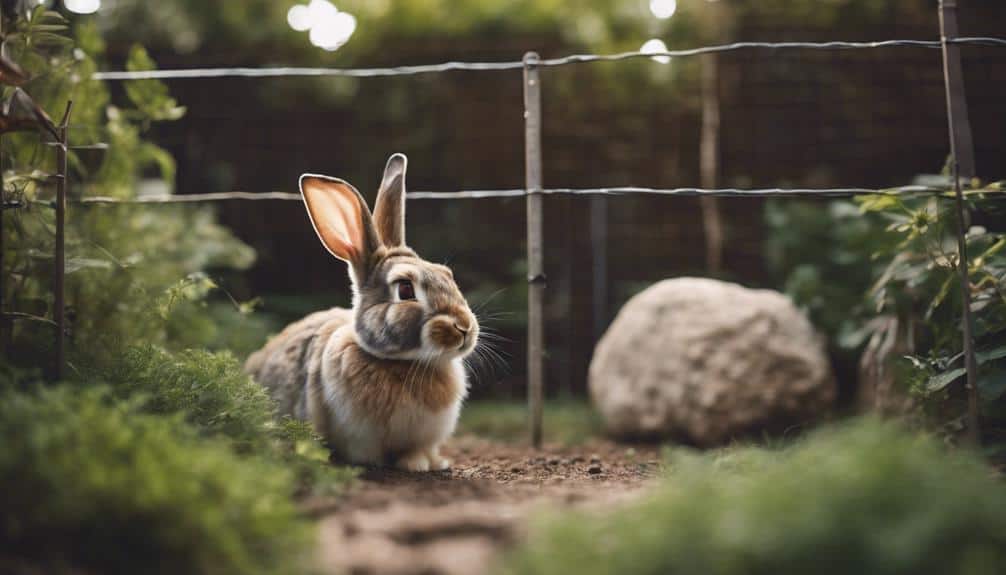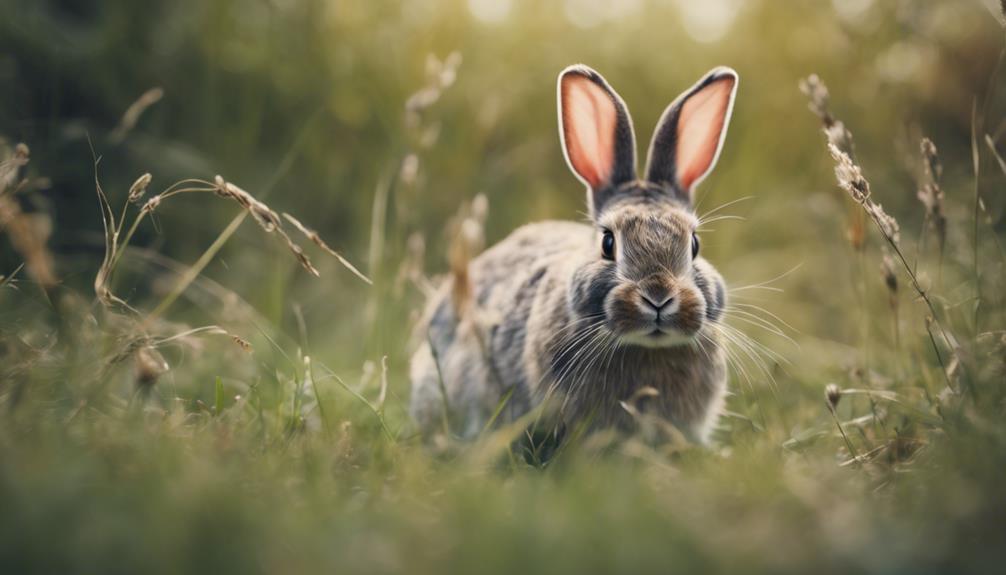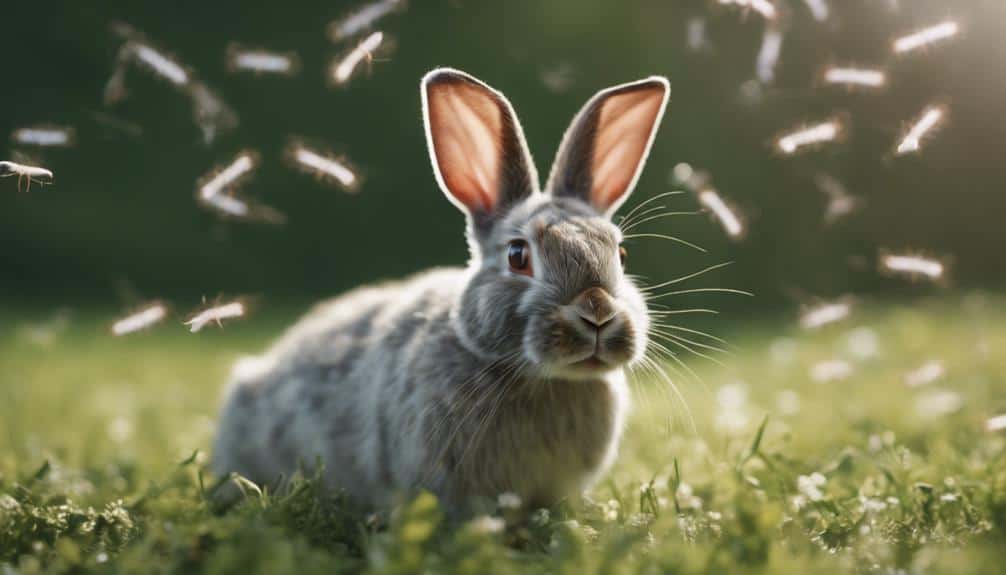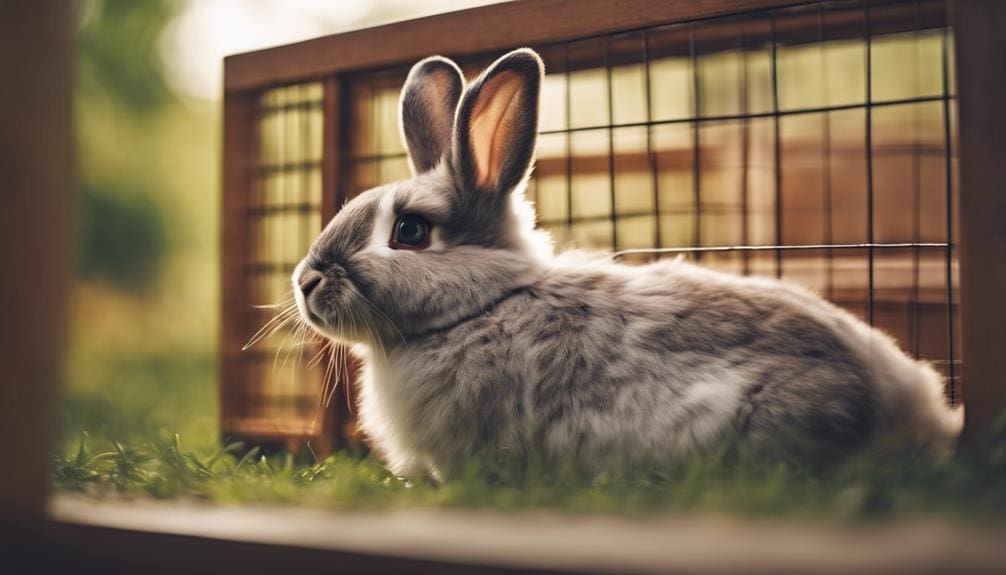Rabbits are like delicate flowers – they need nurturing and protection to thrive. But what happens when they're exposed to the elements without proper care? It's a tough life.
It is possible for rabbits to live outside their cages, but it's a decision that requires a lot of thought and preparation. You need to think about how you'll keep them safe from predators, provide a suitable place to live, and keep an eye on their health.
It's not easy, but if you're willing to put in the effort, it can be a really rewarding experience.
Contents
- 1 Key Takeaways
- 2 Safety Considerations for Outdoor Rabbits
- 3 Predators to Watch Out For
- 4 Common Parasites in Outdoor Environments
- 5 Risks of Flystrike in Rabbits
- 6 Diseases to Be Aware Of
- 7 Managing Extreme Weather Conditions
- 8 Importance of Proper Ventilation
- 9 Protecting Rabbits From Hazards
- 10 Conclusion
Key Takeaways
So, can rabbits live outside their cages? The answer is yes, but with some important conditions. Rabbits can thrive outside if they have proper shelter that protects them from harsh weather and predators. This shelter should be safe and secure, providing a comfortable place for your rabbit to rest and hide.
Regular monitoring and care are essential when keeping your rabbit outside. You'll need to check on them frequently to ensure they're healthy and happy. This includes providing fresh food and water, as well as keeping an eye out for any signs of illness or injury.
While living outside can be great for rabbits, there are some risks to be aware of. Outdoor rabbits are more likely to be exposed to diseases and parasites, which can be harmful if left untreated. To prevent these problems, it's crucial to take measures like flea control and regular health checks.
Overall, with the right shelter, care, and precautions, rabbits can live happily outside their cages. Just remember to stay vigilant and take steps to protect your rabbit from potential risks.
Safety Considerations for Outdoor Rabbits

Rabbits that live outside are exposed to the elements all year round. They need protection from wind, rain, and extreme weather conditions.
To keep them safe, you need to provide a shelter that shields them from harsh winds and keeps them dry during rainy periods. Adding extra bedding to their living space can offer insulation and warmth, especially in colder climates.
Monitoring the weather forecast can also help. By checking the forecast, you can adjust their environment to mitigate any negative impacts on their health.
For instance, you can add extra bedding or bring them to a warmer area if it's going to be extremely cold.
Outdoor rabbits are resilient animals, but they can still get sick if they're not properly cared for.
Predators to Watch Out For
When you have rabbits living outside, you need to be on the lookout for common outdoor predators. These include foxes, coyotes, and raccoons.
Fences can offer some protection, but they're not foolproof. Determined predators can still find ways to get to your rabbits.
That’s why it’s crucial to regularly check your rabbit enclosures and consider additional safety measures. This will help safeguard your rabbits from potential attacks. Additionally, ensuring that your enclosures are secure can prevent unwanted escape attempts, which is essential for their safety. If you have other pets, such as cats, it may be worthwhile to explore innovative solutions like training rabbits for cat doors, allowing them access to safe areas of your home while still keeping them protected. Regular observation and adaptation of their environment are key components in maintaining a safe haven for your beloved rabbits.
Common Outdoor Predators
Outdoor rabbits face a lot of danger from predators like foxes, coyotes, loose dogs, feral cats, raccoons, weasels, and opossums. Even if you have a well-maintained fence, these predators can still find a way in if they're determined.
Raccoons are especially hazardous to outdoor rabbits because they're smart, agile, and won't hesitate to fight when necessary. The problem is, many of these predators are most active at night, making it tough to protect your rabbits.
Outdoor hutches can provide some shelter, but they're not always enough to keep predators away. As a result, your rabbits could get hurt or stressed out.
Even if a predator doesn't attack, just knowing they're around can cause fear and stress, which can lead to health problems and behavioral changes.
It's crucial to understand the risks these common outdoor predators pose and take steps to mitigate them if you want to keep your outdoor rabbits safe and healthy.
Safety Measures for Rabbits
When you keep rabbits outdoors, you need to be aware of the dangers that lurk around.
There are many predators that can attack your rabbits, including foxes, coyotes, loose dogs, feral cats, raccoons, weasels, and opossums. Even if you have a well-maintained fence, determined predators might still find a way in. That's why you need to take extra security measures.
Large predators usually hunt at night, which makes it tough to protect your outdoor rabbits, especially if they're not securely locked in their hutches.
Raccoons are particularly dangerous because they're smart and agile, and they can be violent when they need to be.
In warm climates, fleas are also a big danger to outdoor rabbits.
They can jump high and infest your rabbits, leading to anemia and allergic reactions. To keep your rabbits safe, you need to take precautions against these potential threats.
Monitoring Rabbit Enclosures
If you're keeping rabbits outside their hutches, you need to be on the lookout for predators. These can include foxes, coyotes, loose dogs, feral cats, raccoons, weasels, and opossums. These predators can easily break into outdoor hutches and terrify the rabbits, so it's essential to secure the enclosure effectively.
First, make sure the outdoor area is at a comfortable temperature for your rabbits. You should also provide hiding places where they can seek refuge if they're feeling threatened.
On top of that, create a safe exercise area where your rabbits can move around freely without worrying about predators.
It's also crucial to regularly check the enclosure for any signs of fleas or ticks. These parasites can infest rabbits and pose serious health risks.
Common Parasites in Outdoor Environments

So, you're a rabbit owner, and you want to keep your outdoor bunny safe from parasites. The thing is, these tiny critters can cause some big health problems if you're not careful.
To keep your rabbit healthy, you need to know about the common parasites that might be lurking in your outdoor environment. It's essential to stay informed about the types of parasites that are prevalent in your area.
You should also talk to a vet about how to prevent parasites from affecting your rabbit. They can give you personalized advice on how to keep your bunny safe.
Outdoor Parasite Risks
Outdoor environments can be a breeding ground for parasites that can harm your rabbits. When your rabbits are outdoors all year, they're more likely to come into contact with fleas, ticks, and mites.
These parasites can cause some serious health issues. Fleas can lead to skin irritation and hair loss, while ticks can transmit diseases like Lyme disease. Mites are tiny parasites that can cause skin problems and discomfort for your rabbits.
The thing is, parasites thrive in different weather conditions. When it's warm and humid outside, it creates an ideal environment for these pests to multiply. And it's not just the outdoors that's a problem – temperature changes inside the rabbit hutch due to external weather conditions can also impact parasite activity.
Preventive Care Measures
When it comes to the well-being of rabbits living outside cages, preventive care measures against common parasites in outdoor environments are crucial. Outdoor rabbits are at risk of flea infestations, tick-borne diseases, mosquito-borne illnesses, and internal parasites.
To keep your rabbits healthy, you need to take proactive steps to prevent these issues.
Apply tick and flea preventatives regularly. These products are designed specifically for rabbits and can keep them free from infestations. This is a high-priority measure, as fleas and ticks can cause serious health problems.
Make sure your rabbits' living area is clean, dry, and free from debris. This will reduce the risk of parasite infestations. While this is an important step, it's not as critical as applying preventatives, so we'll call it a medium-priority measure.
Set up a regular schedule for deworming and parasite control. This will help prevent internal parasites and maintain your rabbits' overall health. This is another high-priority measure, as internal parasites can be particularly harmful.
Risks of Flystrike in Rabbits
Rabbits that live outside in hutches are at a high risk of getting a painful condition called flystrike. This happens when flies lay eggs on the rabbit's skin, which can cause severe tissue damage and even be fatal.
So, what exactly is flystrike? It's a painful condition where flies lay eggs on the rabbit's skin, leading to tissue damage and potentially even death.
The risk of flystrike increases in warm weather and when the living conditions are poor. Some rabbits are more likely to get flystrike than others, especially those with dental issues, diarrhea, or urinary incontinence.
The key to helping your rabbit recover from flystrike is to catch it early and get treatment right away. If you think your rabbit has flystrike, you need to act fast and get them to a vet.
To keep your rabbits safe from flystrike, you need to keep their living space clean and sanitary. You should also regularly check them for any signs of flystrike and get them to a vet right away if you suspect they've it. By staying on top of things, you can help protect your rabbits from the risks of flystrike.
Diseases to Be Aware Of

As a responsible rabbit owner, it's essential to keep an eye on your furry friends' health. Rabbits can be prone to various diseases, especially when they live outdoors. When they're exposed to the elements, they can be more susceptible to certain illnesses, especially during cold nights.
One common issue many domestic rabbits face is dental problems. But that's not all – there are several other diseases you should be aware of to ensure your rabbits stay healthy.
If you notice any unusual behavior or symptoms, it's crucial to take action quickly. Some diseases to watch out for include:
GI Stasis, which can cause reduced appetite and lethargy.
Pasteurellosis, characterized by a runny nose, sneezing, and a head tilt.
Myxomatosis, which can cause swollen eyes and respiratory distress.
Managing Extreme Weather Conditions
Protecting your rabbits from extreme weather conditions is crucial for their health and comfort. When it comes to managing extreme weather, keeping them warm and safe is vital.
First, make sure your rabbits have a healthy winter coat. They naturally develop a thicker coat during winter to stay warm.
Providing extra hay in their hutch can also help them stay warm in winter. As they digest the hay, it generates heat, which helps maintain their body temperature.
Damp hay can lead to health issues for rabbits. So, keep their home dry and free from dampness to prevent illnesses.
Regularly inspect their hutch for any drafts or leaks that could compromise their warmth and comfort. Proper insulation is key to protecting them from extreme weather conditions.
Importance of Proper Ventilation

To keep your rabbits healthy and happy outside of their cages, it's crucial to ensure they have proper ventilation. Rabbits are super sensitive to respiratory issues, which can pop up if they're breathing in air that's thick with ammonia. This can happen if the area they're in isn't well-ventilated.
Adequate ventilation is key to removing stale air and bringing in fresh air, which reduces the risk of respiratory infections. The ideal setup should have at least 10-15 air changes per hour to create a healthy environment.
If the ventilation is poor, you might notice your rabbits sneezing, coughing, or having runny eyes. If you don't address these issues quickly, they can lead to more severe health problems.
| Importance of Proper Ventilation |
|---|
| Prevents respiratory issues |
| Removes ammonia buildup |
| Reduces risk of infections |
Protecting Rabbits From Hazards
When it comes to keeping rabbits safe, one of the biggest challenges is protecting them from the many hazards they face every day when they're not in their cages.
To do this, you need to make sure they've a safe and secure outdoor space that prevents them from escaping and protects them from predators. This is crucial because rabbits are prey animals and can be easily hurt or killed by other animals.
You need to provide adequate shelter and shade to shield your rabbits from extreme heat or cold. Rabbits are sensitive to temperature fluctuations, so you need to make sure they've a comfortable environment.
Regularly inspecting the outdoor space is also essential. You need to check for any toxic plants, substances, or potential dangers that could harm your rabbits. This can include things like poisonous plants, sharp objects, or holes that they could fall into.
You need to take steps to prevent flea and tick infestations. These parasites can cause a lot of harm to your rabbits, so you need to use appropriate treatments and keep the environment clean to prevent them from spreading.
Conclusion
Rabbits can definitely live outside their cages, but it's crucial to prioritize their safety and well-being. You've got to think about predators, parasites, diseases, and extreme weather conditions.
If you can create a secure and comfortable outdoor environment, your rabbits will thank you.
When you let your rabbits roam free, you need to keep a close eye on their health. Regular monitoring is key to catching any potential issues early on.
You'll also want to take necessary precautions to prevent health problems from arising in the first place.
Imagine watching your rabbits thrive in a safe outdoor space – it's a wonderful thing!
By taking the right steps, you can give your furry friends the freedom they crave while keeping them safe and happy.






